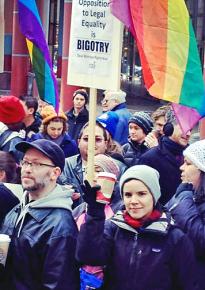Illinois’ equal marriage fight
reports on developments in the struggle for same-sex marriage in Illinois.
"WHAT DO we want? Equal rights! When do we want it? Now!" That chant echoed through the streets of downtown Chicago on January 5 as several hundred protesters rallied for the passage of marriage equality legislation in Illinois and expressed discontent toward the lawmakers stalling on the issue.
A bill that would have granted same-sex couples equal marriage rights in Illinois failed to pass in the legislature's regular session because three senators who supported the bill were absent for the vote. The bill's sponsors, Rep. Greg Harris and Sen. Heather Steans, reintroduced the legislation for a lame-duck session, but the session was adjourned without taking up the issue. So the bill won't come up again earlier than February.
Equal marriage supporters organized the downtown rally to pressure lawmakers to support the bill, even though mainstream LGBT organizations like Equality Illinois opposed having a demonstration because they said not enough people would attend. Despite having just three days to organize, activists were able to mobilize as many as 300 people.

Members of several grassroots organizations turned out, including Join the Impact Chicago, the International Socialist Organization, the Civil Rights Agenda, the Gay Liberation Network, Queer Fest America, Bisexual-Queer Alliance Chicago, the Chicago Teachers Solidarity Campaign, Occupy Chicago's Labor Committee and others.
The rally began with Chicago Gay Men's Chorus singing "Somewhere Over the Rainbow," as onlookers joined the crowd.
A lesbian couple spoke about how the demand for marriage equality affected their family, explaining how same-sex couples are denied parental rights and face unequal treatment in adoption. Activist Lair Scott spoke about how he was unable to adopt because the state didn't recognize his relationship.
Rachel Miller, a restaurant worker and activist in Join the Impact, described how she had to cross the border to Iowa for marriage rights. The dignity that equal marriage meant to her relationship, as well as the material benefits like better health insurance, has made her determined to stay in the fight for the long haul.
Among those attending the rally were Chicago teachers and Occupy activists as well as state workers concerned about the gutting of their pensions. Connecting these fights, activists spoke to the crowd about how marriage rights relates to the other ongoing struggles.
MANY PROTESTERS made the case that the LGBT rights movement fits perfectly in with recent struggles like Occupy Wall Street and the Chicago teachers' strike. The right to marriage is a class issue as well as a civil right. From Social Security benefits, health insurance coverage, workers' compensation, veterans' benefits to the right to not lose ownership of your home after your partner dies, the right to marriage for LGBT couples is a piece of today's class struggle.
Many rank-and-file union members at the rally saw the connection with this fight and other struggles that affect workers. A stronger alliance between LGBT and labor has also formed out of this issue and others. The Chicago Teachers Union has formed its own LGBT caucus and now marches in Chicago pride parades.
Mark Mains, a third-grade teacher from Mukilteo, Wash., and a member of the Mukilteo Education Association, explained that there are practical and important reasons unions are so strongly in favor of the freedom to marry. He said:
It is a labor issue. As a union, we bargain collectively for benefits--family benefits like medical care, life insurance, etc. Our union is dedicated to supporting the dignity of all its members, regardless of who they choose to love. But we can't bargain for any rights that aren't codified by state law.
Even though Democrats dominate the state house, the senate and the governor's mansion, the bill still died in the legislature. Now it could take weeks for the newly sworn-in legislature to pass the law. And while equal marriage is waiting in Illinois, it's inching along on the federal level, as challenges to Proposition 8 and the Defense of Marriage Act are scheduled to be heard by the Supreme Court.
Illinois voters support marriage equality in the state 47 percent to 42 percent. Blacks support the measure by a wider margin of 60 percent to 16 percent, as do Latinos at 70 percent to 23 percent.
Protest has a substantial long-term effect on people's attitudes. Recent LGBT victories at the state level were made possible by the militant grassroots movement that erupted after Proposition 8 passed in California.
How long it will take for gay marriage to win a victory in Illinois and then the U.S. Supreme Court depends on the level of protest and organized struggle we are willing to wage in our streets.
If we want equal marriage, we must fight for it. And we must do so in the same way we've won anything else--by organizing the grassroots. As Cleve Jones, a union organizer and gay activist who called us to action years ago, said, "If you think you are equal, then start acting like it."


